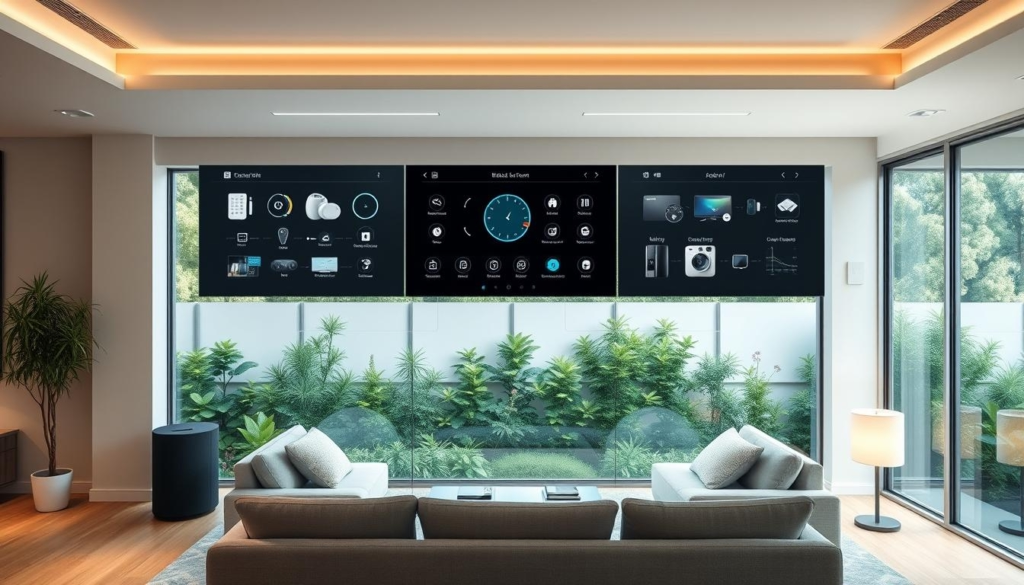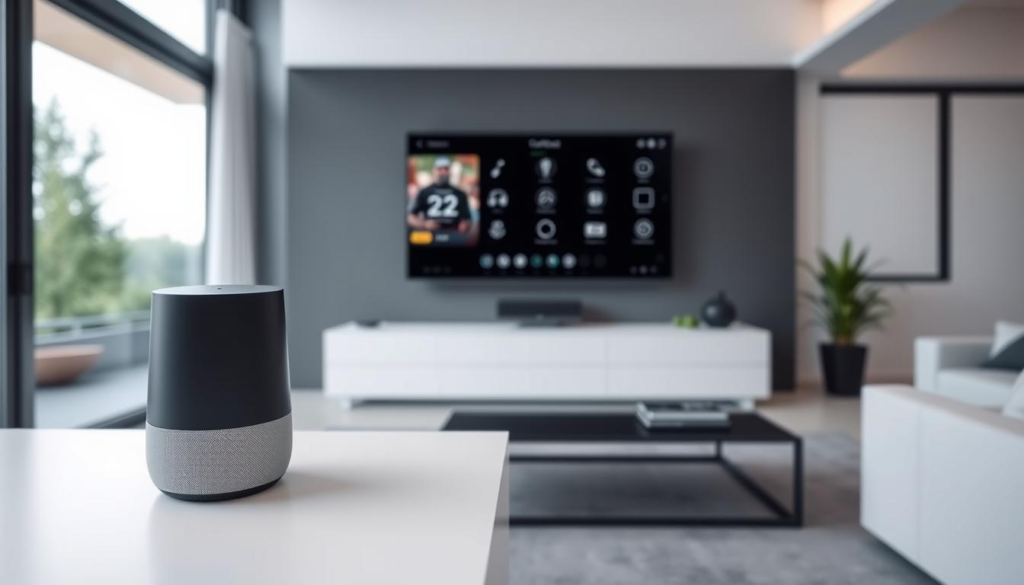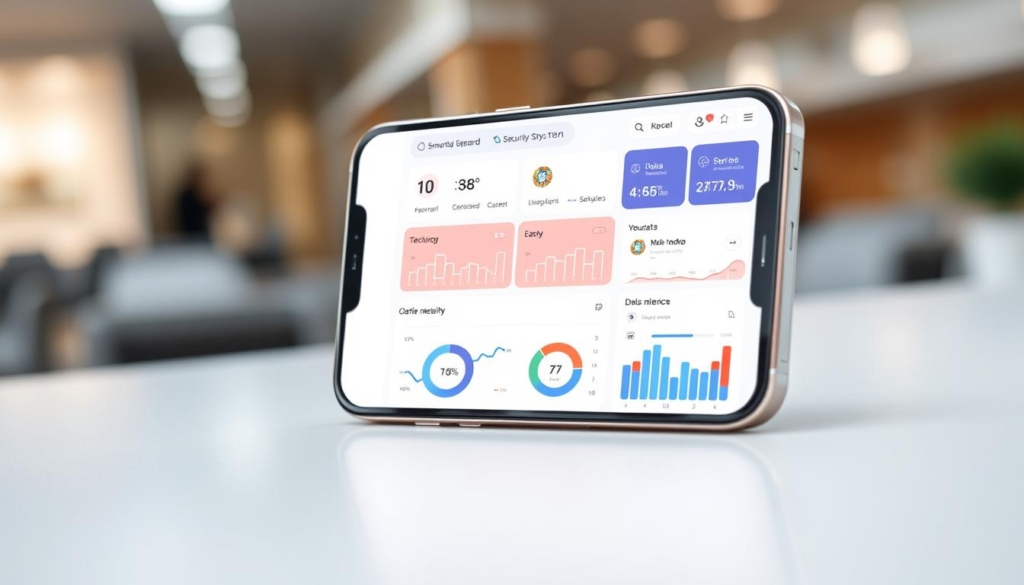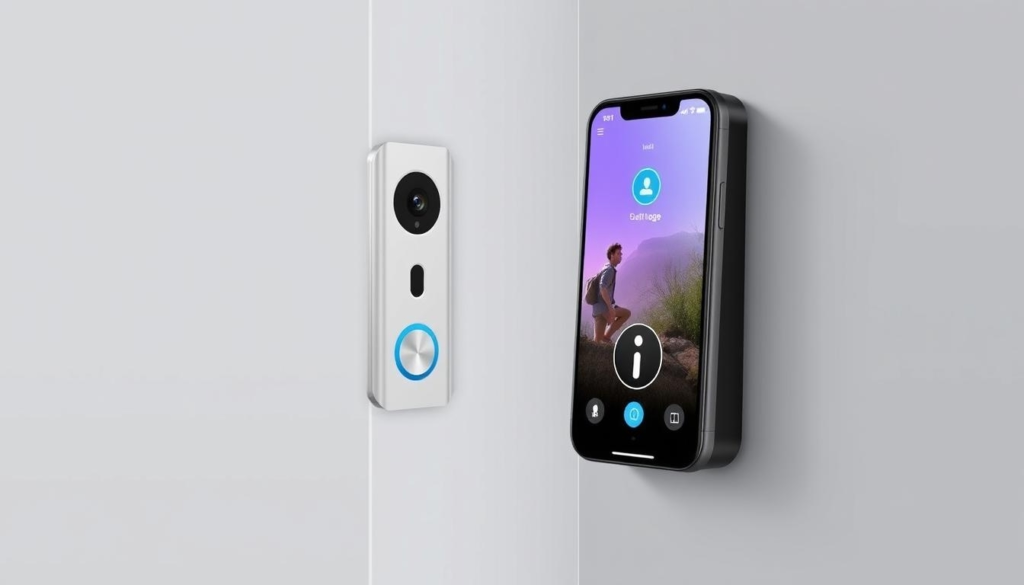You are witnessing a revolution in Kenya’s real estate market with the advent of smart home technology. The integration of technology into living spaces is transforming the way Kenyans live, making their homes more comfortable, secure, and efficient.
The concept of smart homes is gaining popularity, and it’s not hard to see why. With the ability to control lighting, temperature, security, and entertainment systems remotely, home automation is becoming a staple of modern living in Kenya.
As technology continues to advance, the future of real estate in Kenya looks increasingly high-tech. The growing accessibility of smart home systems is making it possible for more homeowners to experience the benefits of a connected home.
Key Takeaways
- Understanding the concept of smart homes and their benefits.
- Exploring how smart home technology is transforming Kenyan living spaces.
- Learning about the main components of a smart home ecosystem.
- Discovering the growing accessibility of smart home technology.
- Understanding what constitutes a truly “smart” home in the Kenyan context.
The Rise of Smart Homes in Kenya
The rise of smart homes in Kenya is a testament to the country’s growing tech-savvy population and infrastructure development. You are witnessing a significant transformation in the real estate sector with the integration of smart home technology.
“The future of real estate is not just about buildings; it’s about creating an ecosystem that enhances the living experience,” says a leading property developer in Kenya. As urban centers like Nairobi and Mombasa continue to grow, the demand for smart homes is on the rise.
The adoption of smart home technology in Kenya is driven by several factors, including increased internet penetration and the desire for convenience and security. You, as a homeowner, are now able to control lighting, temperature, and security systems remotely, making life easier and more efficient.
Key drivers of smart home adoption in Kenya include:
- Increased internet penetration and mobile connectivity
- Growing demand for convenience and security among homeowners
- Innovative property developers incorporating smart features into new residential projects
- Young professionals and tech-savvy homeowners embracing smart home technology

The COVID-19 pandemic has also accelerated interest in home automation and remote-controlled systems, as people look for ways to minimize physical contact and enhance their living experience. Kenya’s smart home market is growing at a pace comparable to other African countries, with local tech companies playing a crucial role in promoting smart home adoption.
As the smart home market continues to evolve, you can expect to see more innovative solutions and integrations that make your home even smarter and more connected.
What Makes a Home “Smart”?
A home becomes ‘smart’ when it’s integrated with advanced technology that simplifies your life. At its core, a smart home is equipped with a system that connects various devices, allowing for seamless control and automation.
The fundamental components that transform a regular house into a smart home include a central control system, internet connectivity, and a range of smart devices. The central control system acts as the brain of your home, integrating different technologies to create a cohesive and efficient living environment.

Automation and remote control capabilities are key features that define smart home functionality. With these features, you can manage your home‘s lighting, temperature, security, and entertainment systems from anywhere, at any time, using your smartphone or voice commands.
| Feature | Description | Benefit |
|---|---|---|
| Central Control System | Integrates various smart devices | Simplifies home management |
| Internet Connectivity | Enables remote access and control | Enhances convenience and flexibility |
| Smart Devices | Range of devices for lighting, security, etc. | Improves home efficiency and security |
The integration of different smart devices creates a cohesive system that enhances your living experience. User-friendly interfaces are crucial for controlling smart home features, ensuring that you can easily navigate and utilize the technology. Furthermore, the incorporation of artificial intelligence and machine learning technologies elevates smart home capabilities, making your home more intuitive and responsive to your needs.
Key Benefits of Smart Home Technology
You can significantly enhance your living experience with the numerous benefits of smart home technology. By integrating smart devices into your home, you can enjoy a more comfortable, secure, and energy-efficient living space.
One of the primary advantages of smart home technology is its ability to enhance security. With integrated monitoring and alert systems, you can keep your home and loved ones safe. Smart security systems allow you to monitor your home remotely, receive alerts in case of suspicious activity, and even control access to your home.
- Improved energy efficiency and potential cost savings on utility bills
- Enhanced convenience factors that improve daily living experiences
- Increased property value in the Kenyan real estate market
- Customization options to meet specific household needs
- Accessibility benefits for elderly or disabled residents
- Contribution to sustainable living practices in Kenya
Smart home technology also promotes energy efficiency, helping you reduce your utility bills and contribute to a more sustainable environment. By optimizing your energy consumption, you can save money and reduce your carbon footprint.
Furthermore, smart homes can increase your property value in the Kenyan real estate market. As technology continues to advance, the demand for smart homes is likely to grow, making your property more attractive to potential buyers.

By adopting smart home technology, you can enjoy a more comfortable and convenient living experience. With the ability to control your home’s systems remotely, you can ensure that your home is always secure and ready for you.
Smart Lighting Solutions

In Kenya, smart lighting is transforming the way you live and interact with your home. With various innovative solutions available, you can enhance your home’s ambiance, security, and energy efficiency.
WiFi-Enabled Bulbs and LED Strips
WiFi-enabled bulbs offer a range of features, including color changing, dimming, and scheduling. For instance, Philips Hue bulbs can be controlled remotely using a smartphone app, allowing you to adjust the lighting to suit different moods and occasions. LED strips are another popular option, providing flexible and decorative lighting solutions for ambient and accent lighting.
These bulbs and strips can be integrated with popular voice assistants like Amazon Alexa and Google Home, enabling voice control for hands-free lighting management.
Motion-Activated Lighting
Motion-activated lighting is a convenient and secure solution for Kenyan homes. These lights turn on automatically when motion is detected, providing illumination when you need it most. This feature is particularly useful for outdoor lighting, enhancing security and deterring potential intruders.
By installing motion-activated lights, you can also save energy by ensuring that lights are only on when necessary.
Smart lighting solutions offer numerous benefits, including energy efficiency and enhanced home security. By adopting these innovative lighting systems, Kenyan homeowners can enjoy a more convenient, comfortable, and sustainable living experience.
Smart Security Systems

In Kenya, smart security systems offer a robust solution for homeowners looking to enhance their property’s safety. These systems provide a comprehensive overview of smart security solutions designed for Kenyan homes and properties.
Door Entry Systems
A smart door entry system is a crucial component of a smart home. It allows you to monitor who is in front of your home while you’re away. With systems like the ABB-Welcome door entry system, you are always in control of your front door, no matter where you are, right from your smartphone.
Motion Sensors and Alarms
Motion sensors integrate with your home security network to detect any unusual activity. When combined with smart alarm systems, they can alert homeowners and security companies in real-time, enhancing the overall security of your home.
Smart security systems can be customized based on property size and security needs. They not only deter break-ins but also enhance peace of mind for homeowners. Additionally, battery backup options ensure that your security system remains operational during power outages.
Home Automation Controllers

In the realm of smart homes, the linchpin that holds everything together is the home automation controller. This central device enables you to manage and control various smart devices and systems within your home. With a home automation controller, you can seamlessly integrate different technologies, creating a unified and efficient living environment.
Smart Hubs and Remotes
A smart hub serves as the brain of your smart home, connecting and controlling various devices through WiFi, Z-wave, or Zigbee technology. These hubs allow you to manage lighting, security, entertainment systems, and more from a single interface. Universal remotes simplify control by consolidating multiple device controls into one device, making it easier to manage your smart home.
Voice-Controlled Systems
Voice-controlled systems like Google Home and Amazon Alexa have become increasingly popular in Kenya, offering the convenience of controlling your smart home devices with voice commands. These systems integrate with various smart devices, allowing you to adjust lighting, play music, or secure your home with simple voice instructions.
Automation controllers can be programmed for routines and scenes, enabling you to customize your home’s behavior based on different scenarios or times of day. For instance, you can create a “good morning” routine that opens your curtains, turns on the lights, and starts your favorite news podcast. Additionally, smartphone apps provide remote access to your home automation system, allowing you to monitor and control your home from anywhere.
When selecting a controller for your home, it’s essential to consider compatibility with your existing devices and systems. Future developments in home automation control technology are expected to enhance interoperability and functionality, making it even easier to create a seamless smart home experience.
Smart Doorbells and Entry Systems

Smart doorbells are revolutionizing the way Kenyan homeowners secure their properties, offering a blend of convenience, security, and technological innovation. With various options available, homeowners can choose the perfect smart doorbell to suit their needs.
Wireless Doorbell Options
Wireless doorbells offer flexibility and ease of installation, making them a popular choice among Kenyan homeowners. Options include battery-powered doorbells with multiple receivers, solar-powered waterproof doorbells, and weatherproof models available in various colors and melodies.
These doorbells often come with features such as extended range (up to 100m), multiple song options (up to 38 melodies), and adjustable volume levels, ensuring that homeowners never miss a visitor.
Video Doorbell Features
Video doorbells take home security to the next level by allowing homeowners to visually identify visitors at their doorstep. With smartphone integration, you can monitor who’s at your door from anywhere, at any time.
Key features include two-way communication, allowing you to speak with visitors remotely, and recording capabilities that capture footage of doorway activities, enhancing your home’s security.
Smart doorbells can be powered through batteries, solar panels, or hardwired into your home’s electrical system, offering flexibility in installation. Moreover, they can be integrated with other smart home security systems, creating a comprehensive security solution.
By installing a smart doorbell, Kenyan homeowners can significantly enhance their home’s security and convenience, enjoying peace of mind knowing they can monitor and interact with visitors remotely.
Energy Management Solutions

Effective energy management is crucial for Kenyan homeowners looking to reduce their utility bills and environmental footprint. With the advent of smart home technology, managing energy consumption has become more efficient and convenient.
Smart Plugs and Sockets
Smart plugs and sockets are revolutionizing the way you control your home appliances. Devices like the WiFi Smart Socket Plug allow you to manage your appliances remotely using a mobile app. This not only enhances convenience but also helps in reducing unnecessary energy consumption.
By integrating smart plugs into your home system, you can monitor and control the power supply to various appliances, ensuring that they are turned off when not in use.
Energy Monitoring Systems
Energy monitoring systems provide detailed insights into your energy usage patterns. These solutions enable you to identify areas of high energy consumption and take corrective measures to optimize your energy usage.
By understanding your energy consumption patterns, you can make informed decisions to reduce waste and lower your energy bills, contributing to a more sustainable home environment.
Implementing energy management solutions in your Kenyan home not only helps in reducing your energy bills but also contributes to a more sustainable future. By leveraging smart technology, you can create a more efficient and environmentally friendly home system.
Smart Home Connectivity Options
As you explore the world of smart homes in Kenya, understanding the various connectivity options available is crucial for a seamless experience. Your smart home’s connectivity is the backbone that enables control over various devices and systems.
The primary connectivity protocols used in smart home systems are WiFi, Z-Wave, and Zigbee. Each has its unique advantages and applications.
WiFi vs. Z-Wave vs. Zigbee
WiFi is a widely used protocol that offers high-speed data transfer, making it suitable for applications that require high bandwidth. Z-Wave and Zigbee, on the other hand, are designed for low-power, low-data-rate applications, making them ideal for home automation.
Bluetooth Integration
Bluetooth technology allows for direct device control and communication, making it a convenient option for certain smart home devices. For instance, Bluetooth App RGB Striplight Waterproof-5M is available with LED Strip5050, featuring 60LEDs/meter and IP65 Waterproof rating, controllable via a 24-key Bluetooth controller.
When choosing a connectivity protocol, consider factors such as range, reliability, and power consumption. Mesh networking benefits larger Kenyan homes and properties by ensuring robust coverage.
Smart Switches and Controls

As you explore the world of smart homes in Kenya, you’ll discover that smart switches and controls are revolutionizing the way you interact with your living space. Smart switches offer a convenient and modern way to control your lighting and appliances, enhancing the comfort and efficiency of your home.
Touch-Sensitive Switches
Touch-sensitive switches are a popular choice among Kenyan homeowners due to their sleek design and modern aesthetic. These switches provide a touch of elegance to your home’s décor while offering advanced functionality. With the ability to control multiple light sources from a single interface, touch-sensitive switches simplify home management.
Remote Control Options
One of the key benefits of smart switches is the ability to control them remotely. Using a smartphone app, you can turn your lights on or off from anywhere in the world, providing an added layer of convenience and security. This feature is particularly useful when you’re away from home and want to make it look like someone is present.
Smart switches and controls also offer a range of other benefits, including energy-saving capabilities and the ability to integrate with popular smart home systems. For instance, you can use voice commands with assistants like Alexa or Google Home to control your lighting, making it easier to manage your home without needing to physically interact with each switch.
When it comes to installation, smart switches are designed to be compatible with Kenyan electrical systems, making it relatively straightforward to upgrade your existing switches. However, it’s essential to consider factors like compatibility and the need for professional installation to ensure a seamless integration.
Smart Home Installation Process

Smart home installation in Kenya involves several key steps that ensure your system is set up correctly and functions as expected. First, a preliminary assessment is necessary to determine your home’s readiness for smart technology.
This assessment includes evaluating your home’s electrical infrastructure to identify any potential upgrades needed to support the new devices. Ensuring your electrical system is compatible with smart home technology is crucial for a seamless installation process.
Next, consider your internet connectivity needs. A stable and fast internet connection is vital for the optimal performance of your smart home system. You’ll need to assess your current internet plan and possibly upgrade it to support the additional devices.
When it comes to the actual installation, you have two primary options: DIY or hiring a professional. While DIY can be cost-effective, professional installation ensures that your smart home system is installed correctly and efficiently.
Proper device placement is also critical for maximizing the effectiveness of your smart home devices. This includes strategically placing sensors, cameras, and other devices to ensure they function as intended.
After installation, integrating all components to work together seamlessly is essential. This involves configuring your smart home system to ensure that all devices communicate effectively.
Common challenges during installation in Kenyan homes can include outdated electrical wiring and poor internet connectivity. Understanding these potential issues can help you prepare and overcome them.
Finally, thorough testing is necessary to verify that your smart home system operates properly. This step ensures that all devices are functioning as expected and that your smart home is ready for use.
Cost Considerations for Smart Homes in Kenya
When considering the adoption of smart home technology in Kenya, understanding the cost implications is crucial. The cost of smart home devices can range from KShs1,999.00 to KShs4,999.00 for various items, including smart bulbs, doorbells, switches, and controllers.

The overall cost of smart homes in Kenya depends on several factors, including the type of systems installed and the complexity of the setup. You can expect to pay differently for entry-level, mid-range, and premium smart home systems.
A phased implementation approach can help manage budget constraints. This involves installing smart home devices in stages, starting with essential components like smart lighting and security systems.
While the initial investment in smart home technology may seem high, it’s essential to consider the long-term benefits, including energy savings and potential increases in property value.
Ongoing costs may include subscription services for certain features and maintenance to ensure the systems operate smoothly.
For larger installations, exploring financing options can help spread the initial cost over time, making it more manageable.
Comparing prices between imported and locally available solutions can also help you find the best value for your money.
Compatibility and Integration Challenges
The smart home revolution in Kenya is not without its hurdles, especially when it comes to ensuring that different devices and systems work seamlessly together. As you integrate various smart home technologies, you may encounter several compatibility and integration challenges.
One of the primary issues is the limitation of ecosystems when mixing different brands and standards. For instance, some smart home devices may use different communication protocols such as WiFi, Z-Wave, or Zigbee, which can lead to compatibility problems if not properly integrated.
Integration challenges also arise when incorporating smart home technology with existing home infrastructure in Kenya. This can include issues with wiring, power supply, and compatibility with older systems. Moreover, internet reliability plays a crucial role in the performance of smart home systems, and unstable internet connectivity can significantly impact their functionality.
Power stability is another concern, as fluctuations in power supply can damage your devices or affect their performance. Implementing backup solutions such as UPS (Uninterruptible Power Supply) can help mitigate this issue.
Regular software updates are essential to maintain the security and efficiency of your smart home systems. However, these updates can sometimes lead to obsolescence if not managed properly. Troubleshooting integration problems requires a systematic approach, identifying the root cause of the issue, and applying the appropriate fix.
To future-proof your smart home setup, it’s crucial to select components that are not only compatible with current technology but also adaptable to future advancements. In cases where devices are incompatible, exploring workaround solutions such as using bridges or hubs can help achieve the desired level of integration and control.
Smart Home Maintenance Tips
As a smart home owner in Kenya, understanding the maintenance needs of your system can save you time and money. Regular maintenance ensures your smart home devices continue to function optimally.
To keep your home automation running smoothly, consider the following:
- Regular software updates for optimal performance
- Battery replacement schedules for wireless devices
- Network maintenance for reliable connectivity
- Cleaning procedures for touch interfaces and sensors
Additionally, conducting security audits and backing up system settings are crucial. Troubleshooting common issues can often be done without professional assistance, but knowing when to seek help is also important.
Future Trends in Kenyan Smart Home Technology
The future of smart homes in Kenya is exciting, with several emerging trends set to redefine the industry. As technology continues to advance, Kenyan homeowners can expect significant improvements in their living spaces.
One of the key trends is the integration of Artificial Intelligence (AI) and machine learning in home automation. This technology enables smart homes to learn occupants’ preferences and adjust settings accordingly, enhancing comfort and efficiency.
Another significant trend is the increased integration with renewable energy systems. As Kenya focuses on sustainable energy, smart homes are being designed to seamlessly integrate with solar and other renewable energy sources, reducing reliance on traditional energy grids.
- Health monitoring capabilities are being incorporated into smart homes, allowing for better health tracking and emergency response systems.
- Expanded voice control and natural language processing are making it easier for homeowners to manage their smart homes.
- Robotics integration is on the rise, with robots assisting with household tasks and providing assistance to occupants.
Enhanced security features, including biometric authentication, are being adopted to provide an additional layer of security for smart homes. The advent of 5G technology is also expected to significantly impact smart home capabilities, offering faster data transfer rates and more reliable connections.
| Trend | Description | Benefit |
|---|---|---|
| AI and Machine Learning | Integration of AI for personalized home settings | Enhanced comfort and efficiency |
| Renewable Energy Integration | Seamless integration with solar and other renewable sources | Reduced energy costs and carbon footprint |
| Health Monitoring | Incorporation of health tracking and emergency response | Improved health and safety |
| 5G Technology | Faster and more reliable connections | Enhanced smart home performance |
As smart home technology continues to evolve, standardization efforts are underway to improve compatibility between different devices and systems, ensuring a more cohesive and user-friendly experience for Kenyan homeowners.
Conclusion
Smart homes are not just a trend; they’re the future of living in Kenya, providing a more secure, convenient, and energy-efficient lifestyle. By integrating smart technology, you can enhance your home’s security, simplify your life, and reduce energy consumption.
As Kenya’s real estate landscape continues to evolve, embracing smart home technology is a step towards a more sustainable and connected future. Consider assessing your home automation needs and start your journey towards a smarter, more efficient home.
FAQ
What is a smart home system, and how does it work?
A smart home system is a network of devices that automate and control various aspects of your home, such as lighting, security, and temperature, using sensors, devices, and automation technology. These systems can be controlled remotely using a smartphone or voice-controlled systems.
How do I control the lighting in my smart home?
You can control the lighting in your smart home using WiFi-enabled bulbs and LED strips, which can be adjusted using a smartphone app or voice commands. Additionally, motion-activated lighting can be used to automatically turn lights on and off.
What are the benefits of using smart security systems?
Smart security systems provide an additional layer of protection for your home by using motion sensors, door entry systems, and alarms to detect and deter potential threats. These systems can also be monitored remotely using a smartphone.
Can I integrate my smart home devices with my existing electrical system?
Yes, many smart home devices, such as smart switches and smart plugs, can be integrated with your existing electrical system to provide a seamless automation experience.
How do I ensure that my smart home devices are compatible with each other?
To ensure compatibility, it’s essential to choose devices that use the same communication protocol, such as Z-Wave or Zigbee. You can also use a smart hub to integrate devices from different manufacturers.
What are the energy-saving benefits of smart home technology?
Smart home technology, such as energy monitoring systems and smart thermostats, can help you reduce your energy consumption by optimizing your energy usage and identifying areas of inefficiency.
Can I install smart home devices myself, or do I need a professional?
While some smart home devices, such as smart bulbs, are easy to install yourself, others, such as smart home security systems, may require professional installation to ensure proper functioning and integration.

